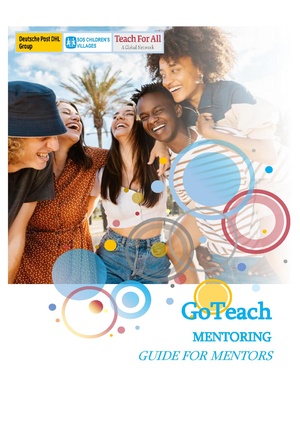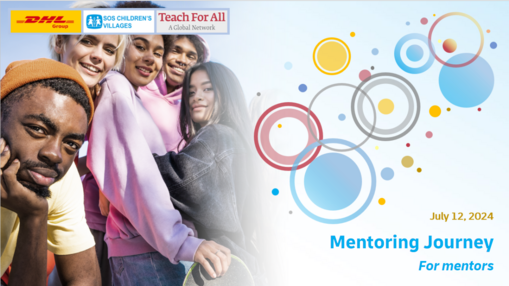No edit summary |
No edit summary |
||
| Line 1: | Line 1: | ||
<bookshelf src="Book:GoTeach Wiki" /> | <bookshelf src="Book:GoTeach Wiki" /> | ||
Mentoring is a collaborative and developmental relationship between an experienced and knowledgeable individual, known as the mentor, and a less experienced individual, known as the mentee. The mentor provides guidance, support and knowledge to the mentees to help them develop their skills, expand their knowledge and achieve their personal or professional goals. | |||
As part of the "Explore" pillar in the GoTeach framework, Mentoring is a collaborative and developmental relationship between an experienced and knowledgeable individual, known as the mentor, and a less experienced individual, known as the mentee. The mentor provides guidance, support and knowledge to the mentees to help them develop their skills, expand their knowledge and achieve their personal or professional goals. | |||
The purpose of mentoring is to facilitate the mentee's growth and development by sharing expertise, experiences and insights. Mentors typically have expertise in a particular field or area and use their knowledge to provide guidance and advice to the mentee. They may offer practical advice, share industry insights, provide feedback on the mentee's performance, help identify and overcome challenges and serve as a sounding board for ideas and decisions. | The purpose of mentoring is to facilitate the mentee's growth and development by sharing expertise, experiences and insights. Mentors typically have expertise in a particular field or area and use their knowledge to provide guidance and advice to the mentee. They may offer practical advice, share industry insights, provide feedback on the mentee's performance, help identify and overcome challenges and serve as a sounding board for ideas and decisions. | ||
| Line 34: | Line 35: | ||
9. Final session | 9. Final session | ||
=== | === Recommendations for Mentoring === | ||
*<span class="col-grey-dark">'''Willingness to volunteer''' - Mentee and mentor take part in the program voluntarily and recognize the personal benefit / value for both sides of the tandem</span> | |||
*<span class="col-grey-dark">'''Independence''' - There is no relationship of dependency between mentee and mentor, i.e. no direct or indirect employment or care relationship</span> | |||
*<span class="col-grey-dark">'''Defined period''' - The mentoring relationship exists for a defined period of time, but can also be continued informally beyond that time.</span> | |||
*<span class="col-grey-dark">'''Personal contact''' - Getting to know each other personally is of great importance for the success of the mentoring relationship. The meetings can be supplemented by e-mail correspondence, telephone calls or, if necessary, Skype contacts, etc.</span> | |||
*<span class="col-grey-dark">'''Confidentiality''' - The mentoring discussions take place in a protected environment and are to be treated as strictly confidential by the participants.</span> | |||
*<span class="col-grey-dark">'''Commitment''' -The binding and reliable handling of appointments and agreements is an essential basic requirement for a successful mentoring relationship.</span> | |||
*<span class="col-grey-dark">'''Expectations and agreement''' - At the beginning of the mentoring partnership, the conditions of the cooperation (e.g. contact, feedback, confidentiality) between mentor and mentee should be clarified, and the expectations and role concepts should be clearly communicated. Personal goals for the mentoring period and possible topics and issues should be discussed.</span> | |||
*<span class="col-grey-dark">'''Mentoring as a process''' - Mentoring should be viewed as a process. ''Mutual openness is necessary for the development of plans or solutions during the mentoring process. In some cases the process may not reach a conclusion per se but the honinig'' of individual perspectives or the development of a strategy to enable an individual to embark on subsequent steps are also valuable results.</span> | |||
=== Download Materials === | |||
{{Textbox|boxtype=important|header=|text=For more materials and translations in French and Spanish, please visit the GoTeach Activity Library on SharePoint: https://dpdhl.sharepoint.com/sites/Sustain-Hub/SitePages/go-programs.aspx In case you have trouble accessing SharePoint and wish to receive further materials or translations, please contact Linda Rasamoeliniaina (linda.rasamoeliniaina@dhl.com).|icon=yes}} | |||
[[File:GoTeach MENTORING GUIDE .pdf|left|thumb]] | |||
[[File:mentoring ppt cover pic.png|thumb|509x509px|[[:File:GoTeach MENTORING JOURNEY .pptx|GoTeach MENTORING JOURNEY .pptx]]]] | |||
Revision as of 09:28, 12 July 2024
As part of the "Explore" pillar in the GoTeach framework, Mentoring is a collaborative and developmental relationship between an experienced and knowledgeable individual, known as the mentor, and a less experienced individual, known as the mentee. The mentor provides guidance, support and knowledge to the mentees to help them develop their skills, expand their knowledge and achieve their personal or professional goals.
The purpose of mentoring is to facilitate the mentee's growth and development by sharing expertise, experiences and insights. Mentors typically have expertise in a particular field or area and use their knowledge to provide guidance and advice to the mentee. They may offer practical advice, share industry insights, provide feedback on the mentee's performance, help identify and overcome challenges and serve as a sounding board for ideas and decisions.
5.8.1 Objectives
Overall, mentoring aims to foster personal and professional growth, enhance learning, build confidence and help mentees navigate their chosen paths more effectively by benefiting from the mentor's knowledge, experience and perspective.
5.8.2 Target Audience
The mentees are young people from vulnerable communities transitioning from school to work. The participants that would benefit from this intervention will be nominated by SOS Children's Villages or a Teach For All network partner.
5.8.3 Location
The location should be agreed between mentor and mentee.
5.8.4 Duration and process
In this context we advise to plan maximum 9 sessions. The actual number of sessions needed depends on the development need of the mentee and should be agreed upon in the Introduction session.
1. Introduction session
2. Topic 1 TBD
3. Topic 2 TBD
4. Topic 3 TBD
5. Topic 4 TBD
6. Topic 5 TBD
7. Topic 6 TBD
8. Topic 7 TBD
9. Final session
5.8.5 Recommendations for Mentoring
- Willingness to volunteer - Mentee and mentor take part in the program voluntarily and recognize the personal benefit / value for both sides of the tandem
- Independence - There is no relationship of dependency between mentee and mentor, i.e. no direct or indirect employment or care relationship
- Defined period - The mentoring relationship exists for a defined period of time, but can also be continued informally beyond that time.
- Personal contact - Getting to know each other personally is of great importance for the success of the mentoring relationship. The meetings can be supplemented by e-mail correspondence, telephone calls or, if necessary, Skype contacts, etc.
- Confidentiality - The mentoring discussions take place in a protected environment and are to be treated as strictly confidential by the participants.
- Commitment -The binding and reliable handling of appointments and agreements is an essential basic requirement for a successful mentoring relationship.
- Expectations and agreement - At the beginning of the mentoring partnership, the conditions of the cooperation (e.g. contact, feedback, confidentiality) between mentor and mentee should be clarified, and the expectations and role concepts should be clearly communicated. Personal goals for the mentoring period and possible topics and issues should be discussed.
- Mentoring as a process - Mentoring should be viewed as a process. Mutual openness is necessary for the development of plans or solutions during the mentoring process. In some cases the process may not reach a conclusion per se but the honinig of individual perspectives or the development of a strategy to enable an individual to embark on subsequent steps are also valuable results.
5.8.6 Download Materials

